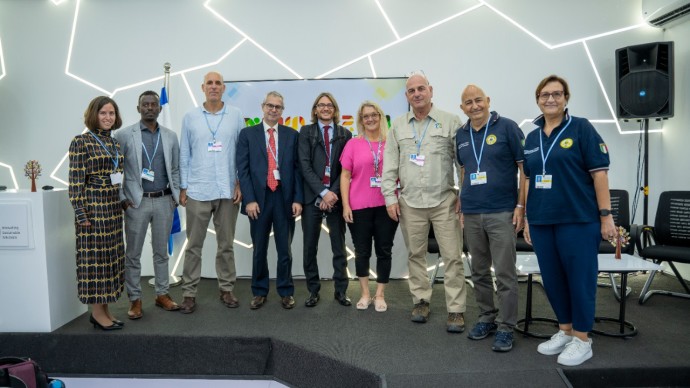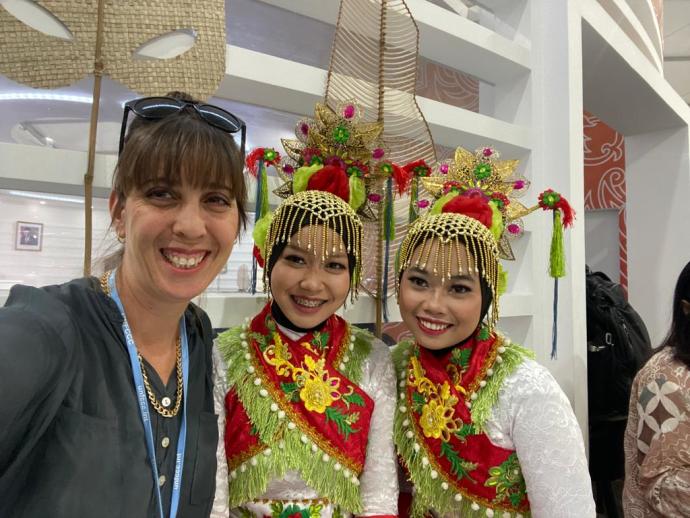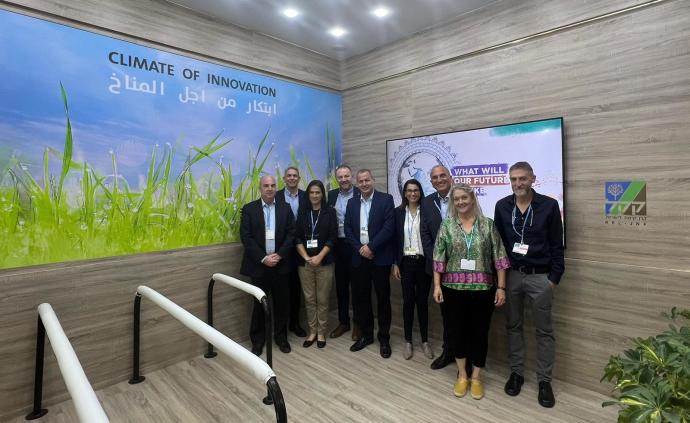The KKL-JNF delegation, headed by Director-General Amnon Ben Ami, participated in the UN Climate Change Conference held in Sharm el-Sheikh, Egypt, from November 6 until November 20. Members of the group presented the knowledge and advanced technologies that KKL-JNF has accumulated in forestry, open space management and water, as well as the cooperation it maintains with organizations and countries worldwide.
Ben Ami said that delegation members presented various plans for dealing with climate change and the environmental crisis. “Even before the climate crisis became an issue on the global agenda, KKL-JNF worked in a wide variety of areas that contribute to this struggle and the preservation of the planet,” said Ben Ami. “Forestry, soil development, water and environmental research are just some of what KKL-JNF does that significantly contributes to the struggle".
“KKL-JNF took part in the climate conference in partnership with the State of Israel to help make Israel an important player in the global fight against the climate crisis. Israel’s position in the world is strengthened by KKL’s ability and willingness to export its knowledge and techniques to countries around the world in sustainable environmental and ecological thinking, utilizing energy properly, and preserving nature. KKL-JNF is the largest Jewish sustainable development organization in the world, and we hope that our efforts will demonstrate the contribution of the Jewish people to making the world a better place.”

In addition to its other core activities, KKL-JNF, under the leadership of Chief Scientist Dr. Doron Markel, are preparing to launch the International Center for Climate Change Research. “KKL-JNF is promoting research and development as key elements to help the State of Israel battle the climate crisis,” he said. “In this spirit, KKL-JNF recently launched an annual $1 million prize to be awarded for groundbreaking Israeli research in the field of carbon emission reduction and has granted 36 scholarships to doctoral candidates, not only to conduct research in all the areas of climate, but to be the future brain bank for shaping KKL-JNF‘s climate policy,” he noted.
Noah Tal, the Director of the Planning Division at KKL-JNF, who also participated in the conference, explained how KKL is at the forefront of sustainable development. “We know how to maintain the balance between development and the environment, because it is KKL’s job to preserve our ecosystems – not only for the sake of the environment but for our society and its wellbeing.”

This is not the first time that KKK-JNF has participated in the climate conference. KKL-JNF has been an official member of the UNFCCC as an observer organization since 2009, and this year too, its attendance at the conference made an impact. “We are partners in this with government ministries, led by the Foreign Affairs Ministry and the Environmental Protection Ministry,” said Tal. “This is the first year the State of Israel, in partnership with KKL-JNF, has created an Israel pavilion to provide a platform for all Israel’s abilities to deal with the climate crisis. This illustrates the importance that we are attaching to this conference, and to the issue of the climate crisis in general, which crosses borders and countries, and requires cooperation and mobilization of everyone to deal with this crisis. Even if we act amazingly well in our own country, we will still be affected by what the other countries in the world are doing, and it is important to join the global struggle.”
A goal-oriented forest
Tal explained that in recent years, the subject of forestry, one of KKL-JNF’s areas of expertise, has taken a central place in almost all the proposed solutions for dealing with the climate crisis. “Informed forestry, i.e., goal-oriented based on science, which knows how to address ecological challenges, is something that the world is currently interested in,” she said. “We took part in panels and talked about international collaborations that deal with forestry. The world looks to Israel as a bright spot in forestry, because in a relatively short period of time, we managed to take degraded land in Israel and restore its ecosystems. For many citizens, the fact that we have all the outstanding services that the forests provide is taken for granted, but it is a lot of work. Another thing that makes Israel unique is that the forests are open to the general public at no charge. We talked a great deal about diverse and goal-oriented forestry, which will be immune to the effects of the climate crisis, and about actions to preserve the soil and prevent hazards. The activities of KKL-JNF reach many areas, including our extensive knowledge of fire prevention, management and rehabilitation of the forests.”

Dr. Gilad Ostrovsky, KKL-JNF’s Chief Forester, spoke at length with international representatives from various countries and led a separate event about forest fires. “We held a professional session with Italian forestry experts, which dealt with the issue of a fire prevention plan and its implementation in the field,” said Dr. Ostrovsky. “We presented our national plan for forest protection and its implementation in protecting the Martyrs’ Forest in the Jerusalem hills. In preparing the plan, we use advanced remote sensing measures that provide us with information about the severity of the risk of developing fires, and we can identify areas at high risk. “We presented to conference participants about the importance of sustainable forest care,” Ostrovsky added. “The intention is to rely as much as possible on natural processes, local vegetation and goal-oriented management that fosters the biodiversity in the forest. Dealing with the climate crisis is causing the entire world to speak this language today.
“What makes Israel unique,” he pointed out, “is that our country is very small, and the forest is constantly threatened by development – buildings and infrastructure. In Europe, the situation is different as in some countries, the rural environment is dwindling, while in contrast, in our country, the settlements are growing and expanding. Therefore, we emphasize forest conservation, striving to increase the scope of the forest and open spaces for the benefit of the public. It is important to emphasize that beyond the absorption of carbon and the mitigation of climate change, the forest makes a great contribution to the environment and society, whether through local cooling, providing shade, preventing floods, and even for inspiration, recreation and leisure. The forest gives us life.”
Dr. Michael Sprintsin, a Forest Engineer in the Western Negev, who participated in the conference, talked about the challenges from the country’s south and KKL-JNF’s work in helping the wilderness flourish and the war against soil degradation and forest fires. “We are very diverse in terms of landscape and climate, which is very much in line with other countries from the Mediterranean basin (Arab countries included), whose region suffers from a change in precipitation, distribution and gradual increase in air temperature that we all feel. Desertification is one of the main points we deal with in the south,” said Dr. Sprintsin. “Many countries have taken the initiative to plant as many trees as possible, to combat climate variability and increase overall environmental resilience. Since KKL-JNF serves as Israel’s forestry service, we held quite a few meetings with similar entities from many countries around the world. One session was with an international coalition for the rainforests, and there was even a meeting with representatives of The Center for International Forestry Research and World Agroforestry (CIFOR- ICRAF), where we discussed the opportunities of cooperation and the application of knowledge and joint research.
“We presented quite a few technologies and shared our knowledge and experience,” he added. “We have excellent monitoring capabilities, remote sensing and spatial technologies. Many professionals in less developed countries don’t have broad access to data or advanced technologies, so they were very interested in it.”
From theoretical to practical
As part of the conference, KKL-JNF staff held a series of events with international representatives, including lectures on the treatment of forest fires and the presentation of advanced systems for detecting and preventing fires that harm nature and biodiversity in hot areas that have little precipitation. KKL-JNF, the government of the Republic of Chad, PRIMA-Med, CIFOR and Bui Power Authority (Ghana), conducted lectures on implementing adaptation strategies using forestry, agriculture and land use. The moderator of the international session was Dr. Doron Markel, KKL-JNF’s Chief Scientist: “Another advantage of KKL-JNF,” said Dr. Markel, “is our ability to cooperate internationally with various countries and organizations. We serve as a bridge to transfer Israeli know-how to the world.”
“At COP 27, we have been able to advance our ability to develop partnerships in many areas of our expertise,” said KKL-JNF Director of International Relations Karine Bolton, “We met many people from around the world and held countless interviews with the international media. It was an important platform for us to meet with colleagues and heads of organizations to learn what’s going on and how we can collaborate with international projects.”
“This year, the discussion is about the practical tools that can be implemented,” she noted. “One of the things I am most proud of at KKL-JNF is that we are an organization that gets things done. We have the knowledge. We have noticed that many of the vulnerable regions, like Africa and even many European countries, are facing desertification and land degradation. They need our knowledge. We have already done it in the Negev, and we have completely restored landscapes, which also helps the tourism and agricultural industries. Many countries have turned to us for help, because some of them know how to plant, but the trees do not usually survive, as there is real science behind it. In the past year, the world has seen that we have passed the prevention phase, and what they thought would happen has happened at a faster pace. Now, we are moving towards solutions through technology and adaptation, learning how to live with the consequences of the climate crisis, in the hope that we can prevent further deterioration.”
This article was written in cooperation with KKL-JNF.
Translated by Alan Rosenbaum
